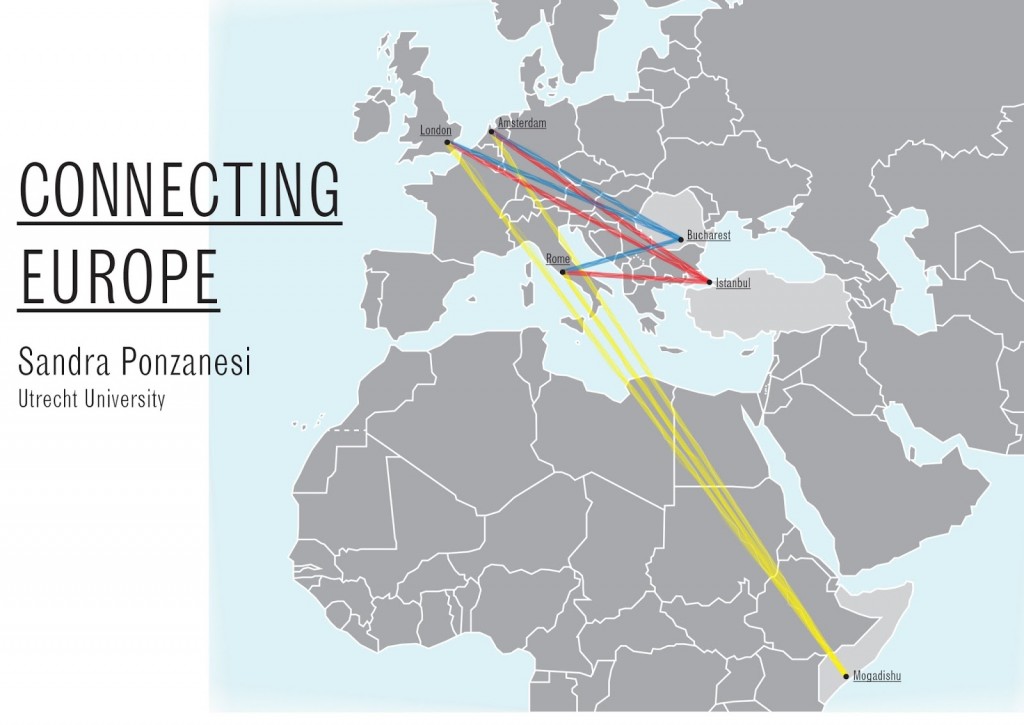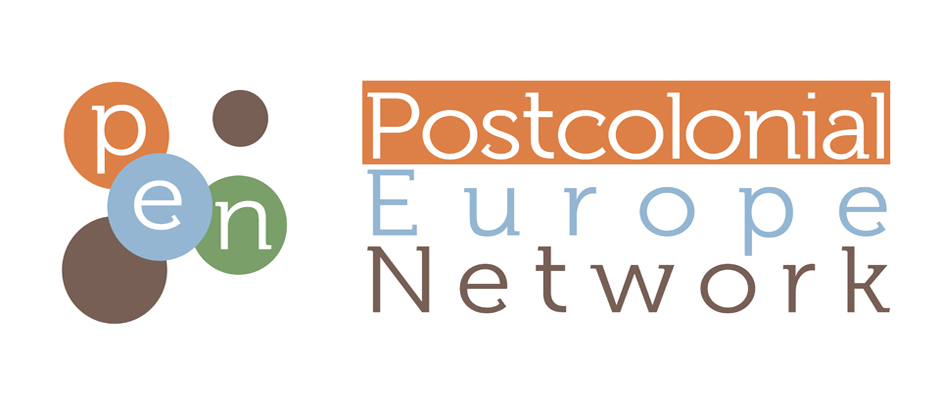
Virtual Reality as Empathy Machine: Media, Migration and the Humanitarian Predicament
2023 to 2028
The NWO project “Virtual Reality as Empathy Machine: Media, Migration and the Humanitarian Predicament” makes an intervention into the field of VR for humanitarian communication by evaluating the potentialities and pitfalls of immersion and empathy through technological innovation.
This project critically investigates the role of VR for humanitarian appeals by asking how and to what extent humanitarian VR can function as an empathy machine, bridging the distance between viewers and mediated others. It researches the impact of VR for humanitarian appeals, in particular concerning issues around migration and refugees.
The project was initiated and is led by Sandra Ponzanesi. The project takes place between 2023 and 2028.
For more information, see here.
……………………………………………………………………………………………………………………………………………………………
Completed Projects

CONNECTINGEUROPE (Digital Crossings in Europe: Gender, Diaspora and Belonging)
2016 to 2021
General project description: The project aims to investigate the relation between migration and digital technologies, in particular the way in which the ‘connected migrant’ contributes to new forms of European integration and cosmopolitan citizenship. The project explores digital diasporas in relation to issues of gender, ethnicity and affective belonging, focusing on how new technologies enhance new forms of connectivity between the homeland and destination countries, bus also across diasporas. The project pioneers a new interdisciplinary method that combines media studies, postcolonial theories, digital humanities and gender studies, drawing from the humanities and social science.
Role: Project leader
Funding: This project is funded by the European Research Council (ERC), by way of a Consolidator Grant awarded to the principal investigator (PI) Prof. Sandra Ponzanesi (Professor of Gender and Postcolonial Studies, Utrecht University, the Netherlands).
Project members UU/Humanities:
dr. Donya Alinejad
Laura Iuliana Candidatu
Melis Mevsimler
Claudia Minchilli
prof. dr. Sandra Ponzanesi
Project website: http://connectingeuropeproject.eu/
Publications: http://connectingeuropeproject.eu/publications/
Final conference: The final conference of CONNECTINGEUROPE, ‘Migrant Belongings: Digital Practices and the Everyday’, took place on 21, 22 and 23 April 2021. The conference was held fully digital, and featured keynote speakers prof. Paul Gilroy, prof. Larissa Hjorth, prof. Nicholas de Genova, prof. Engin Isin and prof. Saskia Witteborn. More information on the conference and recordings of the keynote lectures can be found on the conference website.
Postcolonial Intellectuals and their European Public (PIN)
2019 – 2021
General project description: Who are the postcolonial intellectuals, which of them are currently the most influential and how do they contribute to a new idea of “Europe”? This innovative international network challenges the traditional definition of the “intellectual” by emphasizing the role of migrants, artists, activists and social movements. Postcolonial Intellectuals and their European Publics network (PIN) brings together an international and interdisciplinary network of scholars to investigate the role of postcolonial public intellectuals as crucial actors in renewing the function of the humanities and of democratic participation in Europe.
Funding: This project is funded by the NWO (Netherlands Organization for Scientific Research)-programme Internationalisation in the Humanities.
Role: Principal investigator
International partners:
Utrecht University (Sandra Ponzanesi, PI)
University of Leeds (Graham Huggan, John McLeod, Max Silverman)
University of Warwick (Paulo de Medeiros)
University of Münster (Mark Stein)
University of Lisbon (Ana C. Mendes)
Ca’ Foscari University of Venice (Sabrina Marchetti and Shaul Bassi)
Aalborg University, Copenhagen (Bolette B. Blaagaard)
INALCO, France (Daniella Merolla)
University of Newcastle (Neelam Srivastava)
More information: http://www.postcolonialstudies.nl/p/mission-statement.html

PEN (Postcolonial Europe Network)
01.10.2011 to 30.09.2014
General project description:
The project analyses concrete historical events such as the adoption of treaties by the various European states and their consequences, issues in political theory and political philosophy such as the notions of sovereignty, borders, and law, as well as their representations in a variety of media from literature to film and popular culture. The main aim is to develop theoretical and methodological tools, based on particular case studies, to discuss future ideas of Europe in a postcolonial and postimperial perspective. The project aims to significantly contribute to existing knowledge, and prepare the ground for future multi-disciplinary research, bridging some gaps in current discipline-bound scholarship, and asserting the importance of culture in general, and Humanities-based research in particular, for imagining models for a European polity.
Role: Researcher
Funding: Utrecht University: NWO internationalisering in the Humanities
Project members UU/Humanities:
prof. dr. Paulo de Medeiros
dr. Sandra Ponzanesi
External project members:
Prof. Graham Huggan; Prof. John McLeod; Prof. Max Silverman; Prof. Tobias Doering; Dr. Lars Jensen; Prof. Paul GilroyProf. Iain Chambers;

Mig@net. Transnational Digital Networks. Migration and Gender
01.07.2010 to 31.01.2013
General project description:
MIG@NET explores how migrant individuals and communities participate in the production and transformation of transnational digital networks and the effect of transnational digital networks on migrant mobility
and integration. Transnational digital networks are studied as instances of socio-economic, gender, racial, and class hierarchies, where the participation of migrant communities entails the possibility of challenging these hierarchies. The participation of migrant communities – at times inclusive, joining in larger transnational digital projects, at times exclusive, creating separate and relatively closed transnational spaces – is investigated in detail through particular case studies in seven thematic areas: Border Crossings, Communication and Information Flows, Education and Knowledge, Religious Practices, Sexualities, Social Movements, Intercultural Conflict and Dialogue. The project addresses these issues through a tripartite conceptual and methodological approach: a) a critical approach to the separation between the digital and the real; b) a transnational approach to migration and c) an intersectional approach to gender.
Role: Project Leader & Researcher
Funding: EU grant: 7th European Framework Program
Project members UU/Humanities:
dr. Koen Leurs
dr. Eva Midden
dr. Sandra Ponzanesi
External project members:
Panteion University (Greece); Symfiliosi (Cyprus); Fondation Maison des Sciences de l’Homme (France); University of Hamburg (Germany); University of Bologna (Italy); The Peace Institute (Slovenia) and the University of Hull (UK).

Wired Up: Digital Media as Innovative Socialization Practices for Migrant Youth
01.01.2007 to 30.06.2012
General project description:
In this project, we focus on how new digital media practices involving the internet impact on the lives, identities, learning and socialization of migrant youth. Migrancy, central to this program, embeds many of the local and global paradoxes that also pertain to digital media with their compression of space and time. However the link between the two fields is still under-theorised and is in need of more situated and comparative research. The project aims to monitor, evaluate and assess the socio-cultural specificities of the interaction between youth and digital media in a comparative perspective (migrants versus native Dutch, Moroccan migrants in the Netherlands versus Mexican migrants in the USA, female versus male). The comparative research focuses on a) identity construction and global representations, b) development of new learning strategies and socialization patterns, c) new forms of digital literacy and youth networks, and d) differences and similarities of these dynamics in a cross-national comparison. The project aims to locate the study of the effects of digital media in relation to socio-cultural configurations mediated by nationality, gender and ethnicity. See for more information: http://www.uu.nl/wiredup/
Role: Researcher
Funding: Utrecht University: Utrecht Executive Board, High Potential Project
Project members UU/Humanities:
dr. Fadi Hirzalla
dr. Koen Leurs
dr. Sandra Ponzanesi
External project members:
Prof. dr. Mariette de Haan (UUSW); dr. Kevin Leander
VanderBilt University USA. Dr. Fleur Prinsen (UU GW); Asli Unlosoy (UU SW)
Through global words. Postcolonial literature, Literary Prizes and the academy: 1981-2001
01.01.2003 to 01.09.2007
General project description:
During the past two decades an impressive inventory of postcolonial authors have been awarded prestigious literary prizes. How did non-western writers, or writers from former European colonies, suddenly command the notice and approbation of the judges in charge of awarding prestigious international prizes?
In this research project, I wish to analyse this shift in reception by focusing on four exemplary authors from the English speaking world: Salman Rushdie, V.S. Naipaul, Arundhati Roy and Derek Walcott. More specifically I will investigate the literary and marketing strategies that have allowed these authors to achieve international prominence and be included within the academic discourse. I will do so by offering a typology of the inventive literary techniques and contents deployed in these author’s works (Midnight’s Children, 1981; The Enigma of the Arrival, 1987; The God of Small Things, 1997; Omeros, 1992). Secondly, I intend collecting and critically interpreting the reports of judging committees and the reviews that appeared in the press and media. Finally, I will trace the institutionalisation of the selected authors in the curricula and research programmes of academic institutions in the U.S., Great Britain and the Netherlands. This will demonstrate that the understanding and reception of postcolonial literature is, on the one hand, linked to new global mechanisms of production and consumption which, on the other hand remain beholden to national discourses.
This research project will originally combine an analysis of globalisation with postcolonial theory and literary criticism. It will connect social and commercial issues linked to a rapidly homogenising consumer culture with shifts in the aesthetics of reception, that are increasingly challenging Western norms through a focus on local issues of place and ethnic identity. It will also be a novel critical study that is informed by a wide-ranging exploration of theoretical perspectives and literatures developed in the last decades in particular in the United Kingdom, The Netherlands and North America.
Role: Project Leader & Researcher
Funding: NWO grant
Project members UU/Humanities:
dr. Sandra Ponzanesi

